In Defense of: GM's Hybrid SUVs
Autumn in Texas plays host to a weekly cultural phenomenon known as high school football. Burgeoning grid iron gods burst on to the field of play from inflatable tunnels through mists of smoke and a phalanx of sparkly drill team coeds. A 300-student marching band plays the school fight song while two dozen cheerleaders power tumble across the field to herald the arrival of the young jocks. The stadium fills with ten thousand spectators-– mostly proud parents and rabid students-– who arrived to the game in typical Texas fashion: by truck. It is under the glare of these Friday night lights that I examine the value of GM's new hybrid SUVs.
Contrary to popular belief, these vehicular behemoths are seldom used as single passenger commuter transport. Nor are they all owned by rural hicks working a ranch. They’re mostly driven by busy parents hauling their children, kid’s friends and equipment to dozens of school, church and sporting events. And yes, many of the Lone Star State's SUV owners regularly pull boats to the north Texas lakes. These buyers are, indeed, the “power users” for which these massively-powered big-framed vehicles were designed.
Even if you reject this “justification” for SUV and pickup truck ownership as a luxury our country (or the planet) can no longer afford, even if you disallow the argument that small cars just don’t cut it in America’s rural heartland, know this: Texan big rig buyers aren’t blind or immune to high gasoline prices. They understand and appreciate environmental concerns. And they sure as Hell get the connection between foreign military entanglements and the politics of oil production. For this savvy SUV market at least, the General’s hybridization of the Tahoe makes perfect sense.
Toyota, and to a lesser extent Honda, have occupied the eco-friendly automotive mindspace by fitting hybrid engines into small or midsize front wheel drive cars; vehicles that are already amongst their most economical platforms. Gas – electric propulsion has generally boosted these cars’ fuel efficiency from EPA estimates in the 30mpg range, to the 40mpg range. It’s an amazing technological accomplishment that fully deserves the PR plaudits and financial rewards received.
By comparison, the 4×2 hybrid Yukon looks like a misfire. The two-mode hybrid system “only” delivers 21/22 miles per gallon. Aside from buyers of high-priced luxury cars, no sedan driving consumer in his right mind would settle for that kind of mileage. Mileage in the twenties? How great is that? Counter intuitively, it’s quite amazing. Indeed, by my calculations it is 39 percent better in conservation terms than putting a hybrid engine in an already economical car.
Let’s run some numbers.
The 2008 Honda Civic sedan is powered by a 140hp, 1.8-liter i-VTEC four-cylinder engine. Mated to a five-speed manual, the Civic’s EPA numbers clock-in at 25mpg around town, and 36mpg on the highway. In a year of combined driving (15k miles at 29mpg), a Civic owner would need to pump 517.2 gallons into his or her petrol sipper.
Honda’s effort to supercharge the mpg results with a hybrid electric elevates mileage to 40/45mpg. In a typical year of driving, the Civic owner burns 357.1 gallons of CO2-emitting gasoline (based on combined 42mpg). That’s a savings of 160.1 gallons.
A typical 4×2 Chevy Tahoe rumbling through Lone Star State suburbs has a 5.3-liter V8 Vortec engine mated to ye olde four-speed cogswapper. Tea leaves, chicken bones, and entrails tell the prognosticating bureaucrats at the EPA that the rig will achieve 14mpg while stoppin' and goin' and 20mpg while crusin'. In a year of driving at 16mpg combined, the Tahoe owner will have to feed the beast 937.5 gallons of dead dino juice.
Despite having a larger 6.0-liter V8 engine, the Tahoe Hybrid increases 'round town gas mileage by 50 percent and highway mileage by 10 percent (21/22mpg). Over 15k miles, the hybrid variant chugs only 714.3 gallons; saving the Tahoe driver (and the environment) 223.2 gallons.
In other words, a Tahoe owner that opts for hybrid saves 63.1 more gallons of gasoline every year than a Civic driver who makes the same choice.
This demonstrates what GM has been saying for years: improving the gas mileage of the thirstiest (and most popular) vehicles is more important for reducing consumption, pollution and CO2 than wringing stratospheric mileage from the cars that are already among the most fuel efficient.
Of course, many environmentally-conscious people would like to see Yukon drivers trade-in their “obscenely large” family truckster for a more “practical” Civic Hybrid or suchlike. But as long as we live in a free country, individuals are free to determine which vehicle best suits their lifestyle, financial constraints and belief system. For those of us who huddle against the chill air in rural high school football stadiums, the Chevrolet Tahoe Hybrid looks like a remarkable, yes sensible, option. I wish it well.
More by William C Montgomery
Latest Car Reviews
Read moreLatest Product Reviews
Read moreRecent Comments
- Lou_BC Well, I'd be impressed if this was in a ZR2. LOL
- Lou_BC This is my shocked face 😲 Hope formatting doesn't fook this up LOL
- Lou_BC Junior? Would that be a Beta Romeo?
- Lou_BC Gotta fix that formatting problem. What a pile of bullsh!t. Are longer posts costing TTAC money? FOOK
- Lou_BC 1.Honda: 6,334,825 vehicles potentially affected2.Ford: 6,152,6143.Kia America: 3,110,4474.Chrysler: 2,732,3985.General Motors: 2,021,0336.Nissan North America: 1,804,4437.Mercedes-Benz USA: 478,1738.Volkswagen Group of America: 453,7639.BMW of North America: 340,24910.Daimler Trucks North America: 261,959



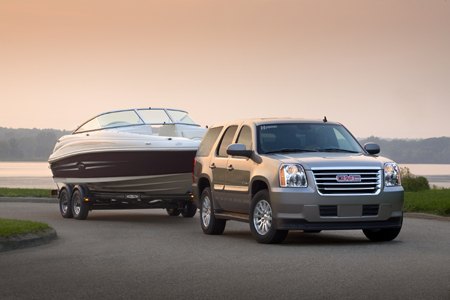















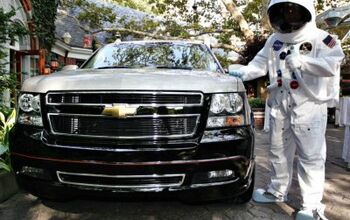
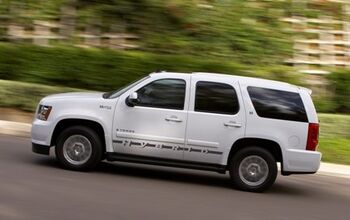
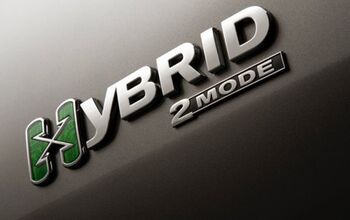
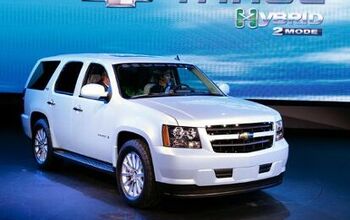
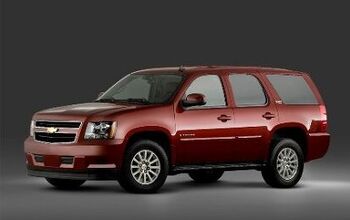


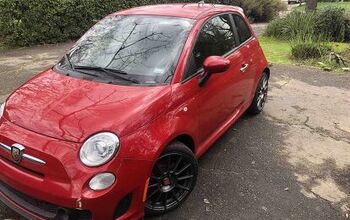







Comments
Join the conversation
Don't get me wrong; i'd kill for an efficient, clean diesel in my Suburban (yes, a 2002 5.3l gas guzzler z71). But not for fuel mileage. Using a diesel to increase fuel mileage is kind of laughable right now because it ends up being done at a higher cost in fuel. What many people are missing is that the highly-efficient light diesels are all in light cars such as Volkswagens, that already make good mileage. A Suburban is a massive vehicle. To do what it needs to do reliably requires at least a mid-sized engine, ie, the 5.3. A 6.0 diesel would do nicely as well. Much less and you risk losing all that beautiful tow capability and load capability. It's just not a Prius, folks. It cost me a lot less than a Prius. It burns about 30 gallons a month, as I work at home and it just gets groceries and so on, with the occasional long trip. It seats seven and carries all their stuff. The only thing on the market with better load and people carrying capability is a full-sized van, which gets worse fuel mileage. So, the truth is that the cost of fuel remains a relatively small percentage of my ownership costs on this beast ( around 10% of the total ), which is something I can live with for what it can do. It is, after all, some sort of combination sport and/or utility vehicle. For what it does, it is an incredibly efficient vehicle. Now, back to the diesel. With a diesel in place, this thing might make 20mpg with a manual transmission. However, it would have a much lower cost maintenance cycle. Fewer oil changes, less worry about electronic parts being defective, so on. A bullet-proof inline six turbo diesel would hit the spot nicely. That being said, I don't think diesel cars will make the splash in the US they have in Europe. Europe's diesel push is aided by government activism. It has driven the price of diesel up and will continue to do so as time goes on. Also, the US was treated to a stream of horrid diesels from GM et. al., and have never gotten a taste for a proper high compression turbo diesel. Oh, and for those of you who believe in global warming, diesel is much more carbon-heavy than gasoline. Why do you think it has a higher energy density?